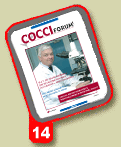
Other articles
in this issue
Asking tough questions
How should European poultry producers fight growing
competition from inexpensive frozen imports? Should
producers seek more protectionist policies? Or should
they rethink their strategies to become more competitive?

What is the best way for European poultry companies
to deal with this new competition? Do they simply need
to become bigger and more efficient? Or should they
steer consumers toward value-added, locally produced,
branded products that command a premium price?
And how will your company meet these challenges?
What does your operation do exceptionally well? What
could it do better? What opportunities have you ignored?
Where will your operation be 10, 20 or even 50 years
from now? What roadblocks stand in your way of
progress?
These are among the many questions facing poultry
producers in and around Europe today. And they are not
easy to answer. No one poultry operation is the same in
terms of management, facilities, marketing or long-term
goals. We do know, however, that change is essential if
we want to remain competitive.
As poultry industry trend-watcher Osler Desouzart
tells us in the article beginning on page 15, “Today’s consumer
wants to know what he eats, from where it came
and how it was produced. He wants assurance that what
he eats is safe for his health and the environment, that it
is fair to the manpower that produced it and that the
meat comes from animals that are well cared for and
healthy.”
Desouzart also warns against mistaking economy for
progress: “A premium chicken sold at a premium price
cannot be made... with second-grade feed, with the lots
managed by untrained
people and with the
‘cost dictatorship’ determining
that the least
expensive ingredients
should always be used.
Quality begins at the
beginning, but has to
go all the way to the
end. There is no ‘partial’
quality, or quality just in
parts of the process, by part of the departments and part
of the time.”
At Schering-Plough Animal Health, we are making
efforts to partner with poultry producers to meet these
challenges. A good example of this effort is the recent
meeting we hosted near Venice (see the Special Report
beginning on page 5) to help producers focus on intestinal
health and ways to produce wholesome, valueadded,
yet competitive poultry while meeting the growing
consumer demand for birds without in-feed
antibiotics.
It is our hope that this special issue of CocciForum —
the first one published specifically for Europe and the
Middle East — will provide inspiration and ideas for
meeting the many challenges presented above.
Paolo Sani, DVM
Schering-Plough Animal Health
Regional Manager-Europe
[email protected]
Source: Cocciforum issue 14





 © 2000 - 2021. Global Ag MediaNinguna parte de este sitio puede ser reproducida sin previa autorización.
© 2000 - 2021. Global Ag MediaNinguna parte de este sitio puede ser reproducida sin previa autorización.